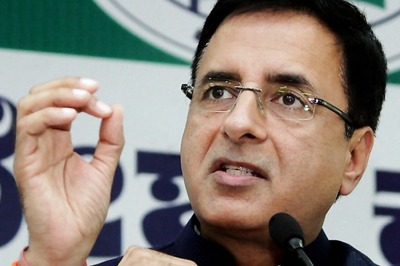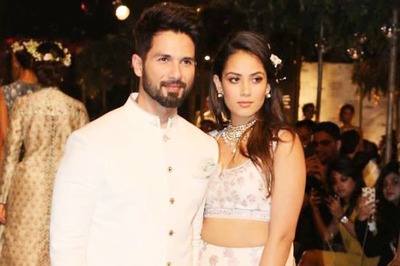
views
A tiger, as they say, never changes his stripes.
But, straws in the wind suggest that driven by its party president and the state’s chief minister, Maharashtra’s tiger in politics, the Shiv Sena, seems to be changing its credo.
In his recent address to the people of Maharashtra, Uddhav Thackeray chose uncharacteristically strong words in warning those giving a communal twist to the 'corona crisis' and circulating incendiary content on social media.
This was significant coming from the chief of a party, which has often been charged of involvement in anti-minority violence.
Just around six months into his term, Uddhav, who lacks experience in either Parliamentary politics or governance, has been paradropped into managing the impact of the covid-19 crisis and its medical, economic and social fallout.
Uddhav’s frequent addresses on social media have been lauded for their style of messaging, even by sections like non-Maharashtrians and the Marathi upper-middle class, which do not fall in the Shiv Sena’s natural electoral catchment.
Unlike his predecessor, Devendra Fadnavis, who was known for his full-throated, intense oratory, Uddhav’s style comes across as composed and calm.
Though reports from the ground suggest that the state government needs to plug gaping holes in its health and social infrastructure, Uddhav has managed to create good optics.
This seems to be a significant moment for Uddhav and the Shiv Sena in more ways than one.
In a first, Uddhav, whose personality and communication skills have often been compared to his father, late Shiv Sena chief Bal Thackeray and estranged cousin and Maharashtra Navnirman Sena (MNS) president Raj Thackeray, has been able to leverage his perceived weakness to his advantage.
Unlike his mercurial father and younger cousin, who are known for their strong personalities and aggressive oratory, Uddhav’s persona is calm, low-profile and rather subdued. Or as someone put it on Facebook recently, Uddhav has the “charisma of a bank officer...”
In this crisis, which is born out of a public health emergency, Uddhav’s composed style of speech, has struck a chord, claim Shiv Sena sources. They add this has helped Uddhav overcome a misconceived notion of being an accidental chief minister, cemented his personal image, and underlined that he is in the driver’s seat.
In an age of post-ideology politics, where image matters more than actual delivery, this may also benefit the Shiv Sena since Uddhav wields authority as both, the chief minister and party president, they point out.
Last year, Uddhav’s elder son and Yuva Sena chief Aaditya became the first from the Thackeray family to contest for public office, marking a watershed in the history of the Shiv Sena. The suave Aaditya is seen as reaching out to an auxiliary constituency of non-Maharashtrians and upwardly mobile Marathi-speakers, for whom the Sena does not strike an emotional chord.
With his persona and style resonating with the educated and the middle class, who believe in a politics of anti-politics, Uddhav may build on this to expand the Sena.
Using cricketing analogy, a Sena supporter dubbed Uddhav and his health minister Rajesh Tope, a Nationalist Congress Party (NCP) leader, who are handling the corona crisis, as VVS Laxman and Rahul Dravid of contemporary Maharashtra politics. Though the jury is out, some exuberant Shiv Sainiks claim their leader may emerge as a regional player in his own right akin to Arvind Kejriwal or Naveen Patnaik, by evolving common-sensical solutions to problems.
However, since it has become evident that the corona crisis and the lockdown are a long haul, this may turn into a test match rather than a T-20 or one day tournament, putting the state government and Uddhav’s mettle to the test.
The real litmus test for Uddhav’s leadership and governance skills lies in the future as the fallout of the corona crisis on the people of Maharashtra becomes clear with the resultant economic downturn and job losses. Once considered among the best managed states in India, Maharashtra has gradually lost some of this sheen, with the social sector today suffering from a legacy of neglect.
As the principal party in the ruling alliance, the Shiv Sena, which is not known for having a strong brains trust, will have to manage the fallout.
The way in which Uddhav handles this around-the-corner crisis may determine the future of his leadership and party.
Another challenge to the Shiv Sena’s ongoing transition lies in the threat to the party’s core constituency from Raj and his MNS, which have taken a turn towards aggressive Hindutva from their previous nativist plank.
Going with the flow of social media driven Islamophobia, Raj has demanded that those who attended the Tablighi Markaz in Delhi be “shot” and did not deserve medical treatment. He has also warned them of retribution once the lockdown is lifted.
The Shiv Sena’s alliance with the NCP and Congress has come with its own baggage, especially regarding its agendas of nativism and Hindutva. The Sena will not be able to espouse these causes in its usual, in-your-face style. Shiv Sena leaders admit that they need to prevent the Bharatiya Janata Party (BJP) and the MNS from eating into this core constituency that forms the bedrock of the party’s support.
Moreover, as a senior Shiv Sena leader admitted, the party cannot afford to turn a blind eye to the growing wave of majoritarian assertion across the country. This sentiment is fuelled further even at a time of a major crisis by a social media driven polarization.
The NCP, the second largest party in the ruling Maharashtra Vikas Aghadi (MVA), was seen as driving the agenda, with deputy chief minister Ajit Pawar being dubbed as the de-facto chief minister. Hence, there is a question mark over whether the party or its leaders will feel comfortable with an increasingly assertive Sena.
(Dhaval Kulkarni is a Mumbai-based journalist and author of ‘The Cousins Thackeray: Uddhav, Raj and the shadow of their Senas’)



















Comments
0 comment